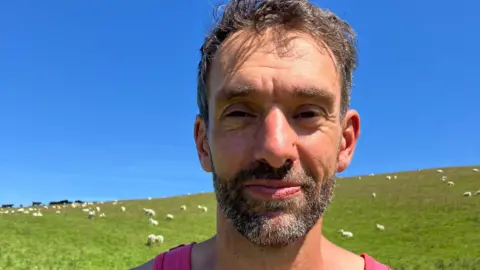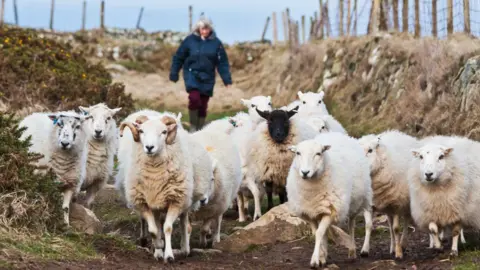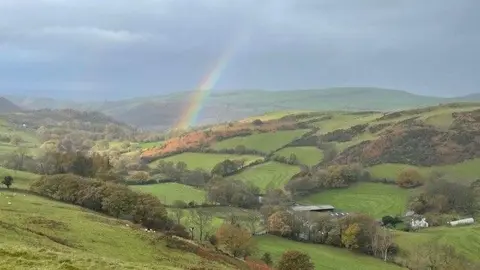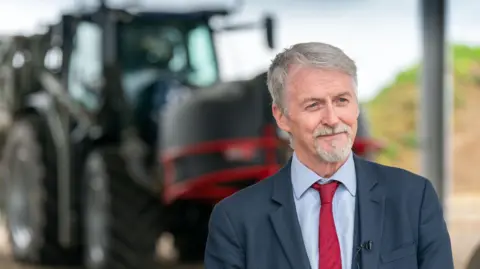'Once in a generation' change for farming in Wales
 BBC
BBCFarmers and environmentalists are bracing themselves with major changes to the financial support available for agriculture in Wales set to be announced.
The Welsh government's protest-hit plan for greener farm subsidy payments - known as the Sustainable Farming Scheme (SFS) - has been seven years in the making.
Industry leaders have described publication of a final set of proposals as "a once in a generation event".
The Welsh government said it would unveil "a scheme for the whole of Wales" that recognised farming's "vital role in Welsh communities" while meeting environmental responsibilities.
Rhodri Lloyd-Williams, who farms sheep and cattle across 750 acres of hillside near Talybont, Ceredigion, said it was "a massive moment".
He said he was hoping for "clarity" after "years of uncertainty" following the Brexit vote in 2016.
The SFS will replace EU-era subsidies, which farmers had received for decades based largely on how much land they had.
On average, 67% of Welsh farm income came from subsidies in 2020-21.
The new approach has far more of an environmental focus, with the aim of rewarding farmers for delivering "public goods" like wildlife habitat and soaking up carbon in the land.
 Rhodri Lloyd-Williams
Rhodri Lloyd-WilliamsDebate over the years has focused on how to make the scheme workable for farmers while ambitious enough to deliver against Wales' environmental goals.
The government has already made some major concessions, such as scrapping a requirement for farms to have 10% tree cover to qualify for funding, after widespread farmer protests in 2024.
Environment groups fear the final scheme will fall short of helping an industry set to become Wales' largest source of greenhouse gas emissions within a decade respond and adapt to the twin threats of climate change and nature loss.
"It's important to acknowledge that they've had a really tough job," Mr Lloyd-Williams said of the Welsh government.
"There's no way when they make the announcement they'll keep everyone happy."
As an organic farmer and member of the Nature Friendly Farming Network, his is exactly the sort of farming system ministers want to support, from rotational grazing of livestock to boost soil health, to planting hedges and trees.
He said he would be glad to see the new scheme include "a bit more encouragement" for this sort of work, which he said could deliver "multiple benefits" for both the farming business and environment.
But "first and foremost we need to keep Welsh farmers farming," he added.
"There needs to be enough support payments for everyone to maintain their businesses, because the worst thing that could happen is that we can't produce enough food in this country."
 Getty
GettyBBC Wales understands the scheme's final details were still being worked on as late as Friday, with an announcement expected on Tuesday.
It comes ahead of the start of the annual Royal Welsh Agricultural Show next week, where politicians from all parties will be setting out their own vision for the future of farming and the countryside with less than a year to a Senedd election.
 Getty Images
Getty ImagesThe SFS will have three tiers - a universal payment where farmers have to sign up to 12 actions from soil health planning and habitat maintenance, to online courses to enhance knowledge and skills related to sustainable farming.
The scheme's optional layer is intended to top up farm incomes with further environmental work, including tree planting.
A collaborative payment will also be available in future to support farmers working together on landscape-scale projects.
 NFFN
NFFN"Clearly we can't ignore the fact that we're moving away from a system of direct farm support to a system which focuses more on the environment," said Gareth Parry, head of policy at the Farmers' Union of Wales (FUW).
Unions had "worked tirelessly" to try and ensure the scheme in its final form would provide "stability and economic certainty" for farmers, he claimed.
The "million dollar question" would be how much funding was being provided.
The announcement would "provide the first opportunity for farmers to really understand what will be required of them... and what they will actually be paid in monetary terms for doing those activities", he said.
"It's more than a once in a generation event," explained Prof Iain Donnison, head of the Institute of Biological, Environmental and Rural Sciences at Aberystwyth University.
He said there had been "very few times in history" where there was an opportunity to start from scratch, "to go back and ask actually what is it that we want from land and farming?"
"Though it will evolve over time, the main structure is likely to stay in place for many decades," he suggested.
And "it affects all of us - clearly we all eat food, we all go into the countryside, things like clean air and water and conserving nature are important to everyone".
 Welsh Government
Welsh GovernmentThe Welsh government said its new scheme would "create a partnership between Welsh farmers and the people of Wales to support sustainable food production while addressing climate change and nature recovery".
The plans had been "simplified following extensive consultation with the agricultural industry" and were "designed to be accessible to all types of farms, including tenant farmers and new entrants", it added.
Deputy First Minister Huw Irranca-Davies described it as "a scheme for the whole of Wales – a whole farm, whole nation approach".
